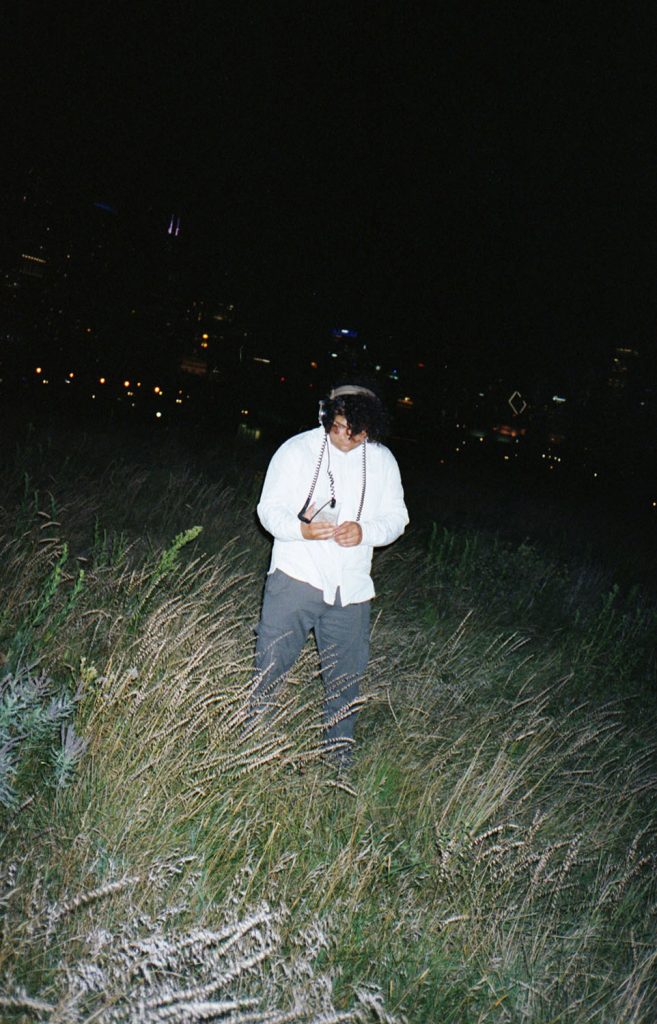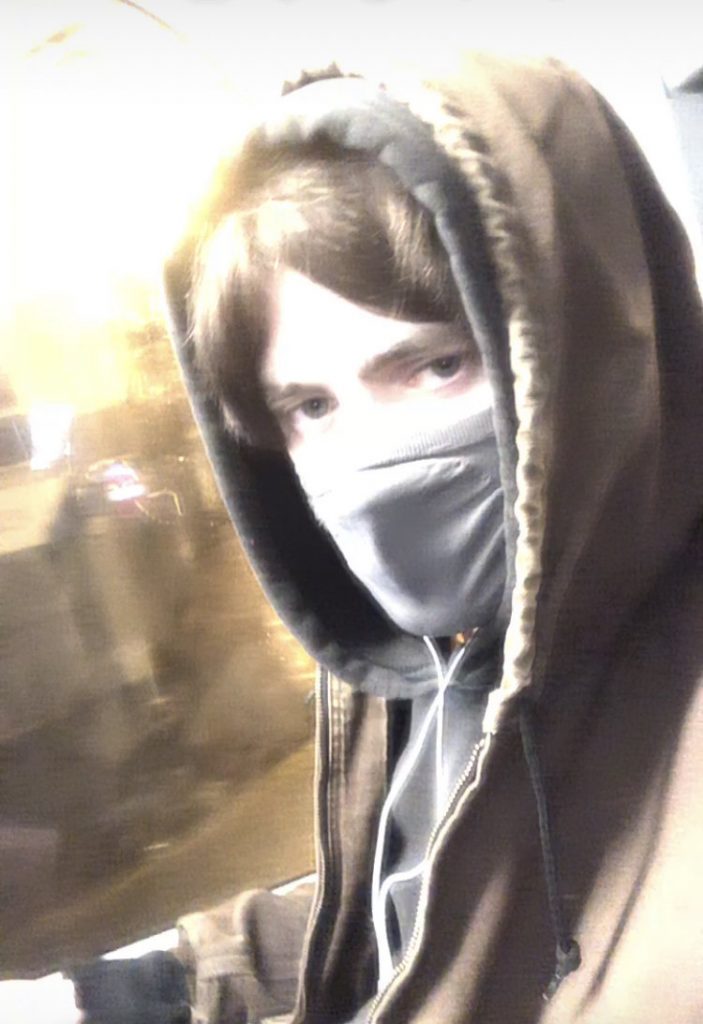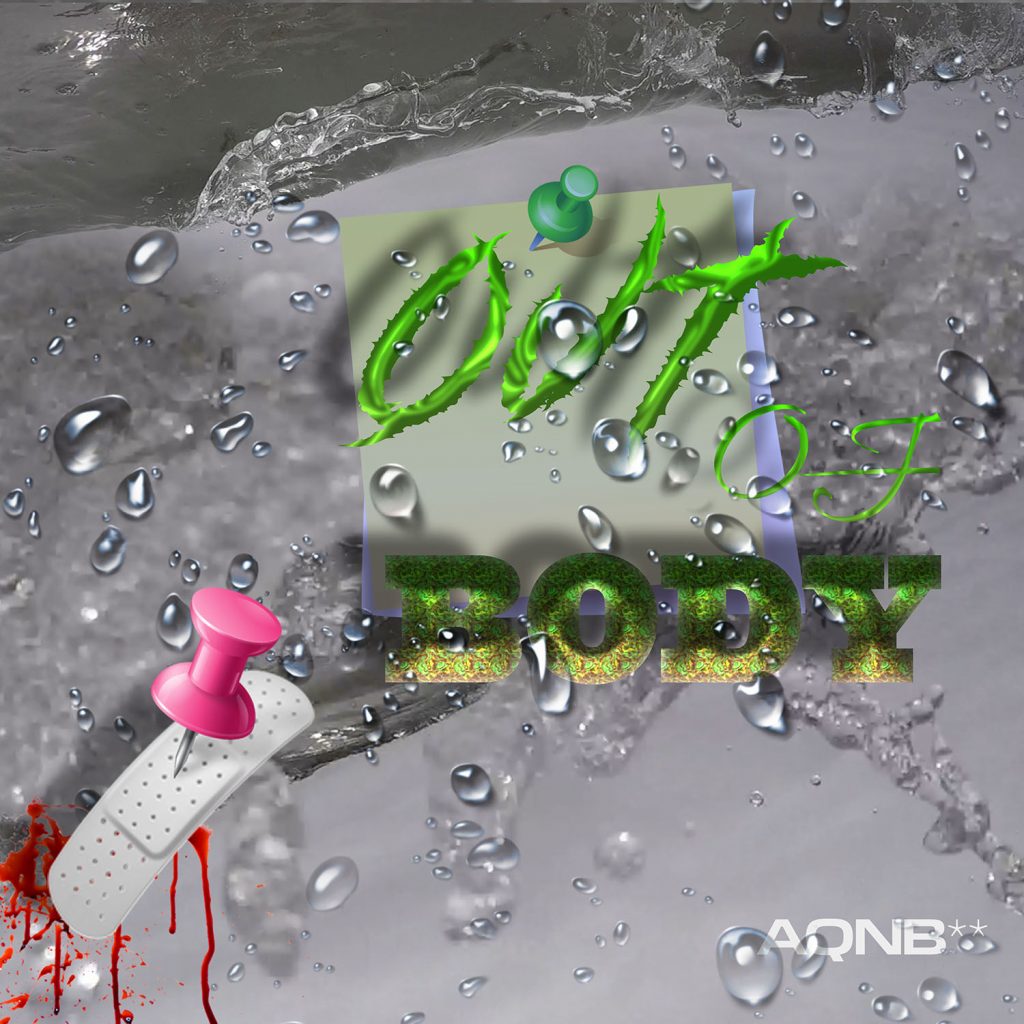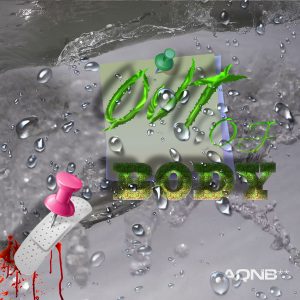“I personally have a really hard time expressing myself in words,” writes Andrew Goes To Hell via email, on how he processes feelings through time before channeling anxiety and mental health challenges into his music. “But when I’m making a song, I hold on to those emotions and I’m able to relay them as lyrics.” The Chicago-based producer and singer-songwriter’s voice leads the melodic pop and guitar of his ‘Wish Upon A Lonely Star’ collaboration with Glasgow’s User2222. Its twinkling sine wave melody and clipped orchestral patches buoy the alto vocal and its words contemplating life and loneliness. They’re themes that are well-paired with AQNB’s latest Out of Body compendium—available now for download via site—where four tracks and two visual artworks circle an unearthly sense of fantasy and interiority.
Both in their early 20s, Andrew Goes to Hell User2222 began their self-taught journey’s into music when they were young, respectively joining a choir and learning instruments in their early teens, before DAWs and video games took them into the realms of nightcore and happy hardcore; emo and pop. “I started teaching myself to play drums when I was 11 or 12 [years old] but I kind of lost interest once I started studying music in high school and it got academicized,” explains User2222. “We used Sibelius for composition in that class too but I didn’t really (try to) understand theory. My teacher would end up finishing my pieces for me so I didn’t fail.” Each of the two producers learned in their early teens via their chosen mediums. Andrew Goes to Hell made post-hardcore remixes on FL Studio and DJ parties. User2222 spent most of their time on Tumblr while producing witch house. It’s roughly a decade later and the two collaborators combine forces across timezones to intersect at a point of “melancholic nostalgia and thinking about the future” and the outcome is both delicate and exhilarating.

**How did you both meet and what kicked off your collaboration, how did ‘Wish Upon a Lonely Star’ come together?
Andrew Goes to Hell: I’ve always been an extreme fan of the dead bart and User2222 stuff for the past four or five years. I was really inspired by a lot of the remixes at the time too, so when we started messaging in mid to early 2020, I was really excited and we got along really well.
User2222: We have a bunch of mutual friends, so I guess we met through that connection. I’d been listening to Andrew’s alt SoundCloud for a minute but I had no clue who’s account it was.
‘Wish Upon A Lonely Star’ came about when I was trying to make a Skins theme-song ripoff (lol). I had written lyrics but they didn’t sound particularly good, so I shelved that idea. I asked Andrew if he wanted to write for or sing on the song and he was down. I sent him the stems and within less than a day, he’d sent back a bunch of vocal and guitar stems that were just perfect.
**It says in this Chicago Reader article, Andrew, that you’ve been DJ-ing nightcore tracks since seventh grade. Where was that?
A: Yess. I guess you could call in nightcore at the time? It was before I knew what nightcore was but I would always play songs like ‘Anima Libera’ by Dj Raaban and crank the pitch fader all way the up because I thought it sounded so sick.
**User2222, listening to your ‘will u still‘ mix there’s also a nightcore element to it, is that an influence? Is that a point where you come together or is that a bit broad given the microgenre was so fundamental to much of the music orbiting ‘hyperpop’ today?
U: Oh yeah definitely. I grew up listening to nightcore and happy hardcore stuff. I don’t know if it was a UK-only site but I used to be on this social network site called Bebo in like 2006 or 07. I’d find my favourite nightcore songs on there from WWE fan edits lmao. It’s cool to see a popular resurgence in this kind of music from a new generation because I feel like it didn’t get the love it deserved back then. It’s interesting to me to hear a fresh take on that type of music from people who may not have necessarily been into it at the time, and are only recently discovering it.

**I’ve also detected Lana Del Rey, t.A.T.u., Evanescence… in your mixes and reworks. I see that Andrew came to this type of 90s, early 2000s music through gaming and Fuse TV, how did you come to it?
U: When I was young I’d just listen to whatever my sister or cousins had downloaded on Limewire and put on their iPods. It was a lot of early-2000s emo, pop and happy hardcore stuff. I used to go to this outdoor market in Glasgow called The Barras every week and my great uncle would buy me a new happy hardcore or màkina compilation CD and a stack of movies filmed off a cinema screen on a shitty-quality portable camera then burned on to a DVD. Màkina and hardcore music have always been relatively big in Scotland, especially when I was growing up. You’d either be naturally drawn to it and get into it, or eventually come to like it through hearing so much of it blasting out of people’s Sony Ericssons on the bus.
**Can you tell me something about the music and art scenes in your respective cities?
A: I genuinely feel like Chicago is one of the most underrated cities in the States. The scene here isn’t very large because people are constantly coming and going but the people are really something special. If Chicago had the resources for the arts like, other major cities, I think it could be a hub and recognized for that.
U: I feel the same way about Glasgow. It’s got a reputation as a hub for artists and creatives in Scotland because of the Glasgow School of Art (fuck GSA), so there’s a constant stream of people coming and going, for better or for worse. Music-wise, I feel like there’s always something new happening, which I love, but there’s definitely still a lot that could be done resource-wise, similar to Chicago.
**Andrew, there are a few interesting artists coming from there, 18+ and Laura Les of 100 Gecs, off the top of my head. Are these artists you relate or have relationships to, is there much of a community around there?
A: Yes! I’ve known Laura for a really long time, she’s the real homie. We used to work together back in 2018 at our college. In 2016 to 2019, there was a growing scene here but since the pandemic happened many people moved to Los Angeles and New York. Now there’s just a lot of new folks in Chicago trying to make stuff happen.

**You’ve both worked with people across the map, do you tend to work remotely and online?
U: I love working with people IRL but my attention span is kinda fried, so sometimes it can be difficult to keep productive. If it’s someone who I’m a fan of or friends with then I definitely prefer IRL working because things just flow better. Even if it isn’t a super-productive session there will always be little scraps or ideas that can be carried over into other projects.
A: Lately, I’ve been enjoying working remotely with people if we don’t have a close relationship because working in person makes me feel like I have to work fast instead of enjoying the moment and experience.
**I’m interested in placing your music into some kind of continuum. Do you have any thoughts on where you’re coming from creatively, and how you think that fits into music more broadly?
U: I’m not really sure where my music would fit in in particular, if at all. I started this project mainly as a means to release the silly little stream of consciousness remixes or songs I’d make and I haven’t veered far from that in terms of how I go about making my stuff imo. Overthinking it is when it stops being fun for me, so I try my best to just focus on making the stuff that’s in my head and have fun while doing it.**














